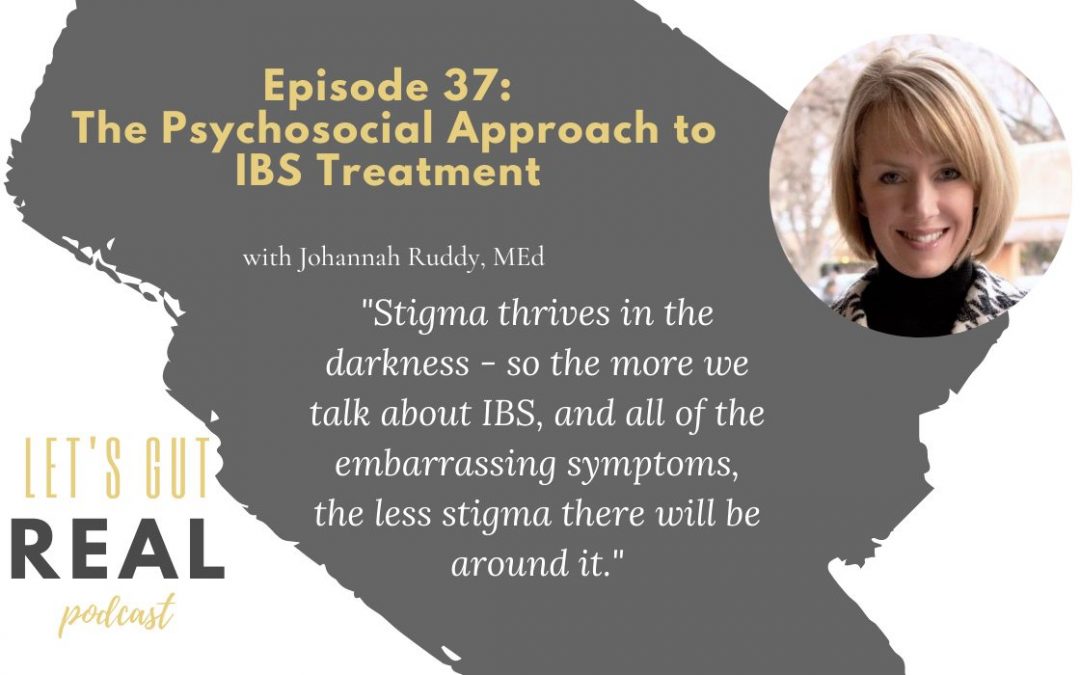The psychosocial approach to patient care, which looks at both the psychological and social aspects of a patient’s life, has an overall impact on a patient’s symptoms and quality of life. Learning to advocate for yourself when you are struggling with IBS can be incredibly empowering. Johannah Ruddy and I discuss how effective communication of IBS symptoms with health care practitioners can be of benefit for both the health care provider and the patient.
Nutrition Pearls for Psychosocial IBS treatment
- Patient centered care is crucial and it is of benefit for both the patient and the health care provider
- Health care providers should take a proactive role in the way that they support their patients who are struggling with disorders of the gut-brain interaction
- Consider the value of making sure a patient understands their diagnosis and can take a shared role in the responsibility for their care
- Consider that functional diseases are not understood very well by the medical community
- Functional diseases are often seen as less legitimate and less serious. But functional diseases are NOT less legitimate nor are they less serious
- Stigma is a big issue with any functional diagnosis – such as IBS, consider the role that stigma plays in a patient’s acceptance of their own IBS diagnosis, and how you can talk to patients about stigma around their disorder and how they experience it
- Part of the process of eradicating stigma is to just talk about it
Today I interviewed Johannah Ruddy on the psychosocial approach to IBS treatment.
Johannah Ruddy is a national expert, researcher, and writer on teaching communications skills to patients and providers and currently serves as the Executive Director of the Rome Foundation. She has 22 years of executive leadership experience working with a variety of non-profit organizations nationwide and a strong background in writing for patients as well as a speaker at GI practices, medical centers, and conferences in the area of provider communication and patient advocacy.
Her new book, co-authored with Dr. Drossman, Gut Feelings- Disorders of Gut-Brain Interactions, A Guide for Patients and Doctors is now available on Amazon.
She holds a Bachelor of science degree from the University of New Mexico in Political Science, a Masters of Education from New Mexico Highlands University and is a doctoral student at Campbell University. She lives in Wake Forest, North Carolina with her husband of 21 years and their two sons.
We talk about:
- How Johannah became interested in IBS
- Johannah’s own experience with IBS
- Johannah’s work as a patient advocate & her current work in disorders of the gut-brain interaction
- Frustrations for patients diagnosed with IBS
- How to better communicate IBS symptoms with doctors
- How clinicians can diagnose and treat IBS and other digestive disorders
- How health care providers can properly communicate with patients who have disorders of the gut-brain interaction
- Why patient centered care matters and how it can benefit both the doctor and the patient
- What IBS patients wish they knew about their diagnosis and the journey
- The relationship between functional diseases and associated stigma
- The stigma with IBS – how does research on disorders of the gut-brain interaction change that?
- Role of stigma in the patient’s acceptance of an IBS diagnosis and their quality of life
Connect with Johannah on Instagram @johannahruddy on Twitter @JohannahRuddy or on LinkedIn. You can find her book: Gut Feelings- Disorders of Gut-Brain Interactions, A Guide for Patients and Doctors which is now available on Amazon: https://romedross.video/GutFeelingsWebsite



Recent Comments